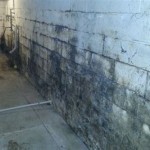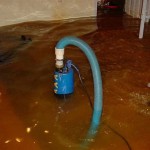Odor From Sump Pump In Basement: Essential Aspects
Sump pumps are essential in preventing flooding and keeping basements dry. However, a musty or foul odor coming from the sump pump can be concerning and demands attention. Identifying the cause of the odor is critical to ensuring a healthy and comfortable indoor environment.
1. Evaporation of Standing Water
If the sump pump isn't in use frequently, the water left in the basin may evaporate, leaving condensation and moisture on the walls and floor. This stagnant water harbors mold, mildew, and bacteria, leading to a damp, musty smell.
2. Decomposition of Organic Matter
Sump pumps are designed to remove water, but if organic matter like sewage, leaves, or dead rodents enters the system, it can decompose, releasing unpleasant odors. Clogged discharge lines or damaged pipes can also trap organic material, contributing to the odor problem.
3. Sewage Backup
In rare cases, a backed-up sewer line can cause sewage to enter the sump basin. The resulting odor is usually strong and highly unpleasant. If you suspect a sewage backup, call a professional plumber immediately to address the issue.
4. Mold and Mildew Growth
The dark, damp environment of a basement can promote mold and mildew growth, especially if there is water damage or moisture present. The musty odor associated with mold and mildew is often noticeable near the sump pump or in the surrounding area.
5. Pump Failure
A malfunctioning sump pump may fail to remove water effectively, leading to water buildup in the basin and potentially creating an odor. Additionally, faulty electrical connections or a burnt-out motor can sometimes produce a burning smell.
Addressing the Odor
To eliminate the odor from a sump pump in the basement, it's essential to address the underlying cause. Regular maintenance and cleaning of the sump pump and basin, including disinfecting with a bleach solution, can prevent odor buildup.
Inspect the discharge line regularly for clogs, cracks, or leaks. If necessary, clean or replace the discharge line to ensure proper water drainage. Seal any gaps around pipes or the sump pump basin to prevent water leaks and moisture accumulation.
In the case of sewage backup, it's crucial to contact a qualified plumber to resolve the issue and prevent potential health hazards. For persistent odor problems or mold growth, professional inspection and remediation may be necessary.
Conclusion
An odor coming from a sump pump in the basement can indicate a variety of issues, from harmless evaporation to serious problems like sewage backup or mold growth. By understanding the underlying causes and taking appropriate steps, homeowners can effectively address the odor and maintain a healthy and comfortable indoor environment.

Sump Pump Smells What They Mean And To Do

Does Your Sump Pump Smell How To Get Rid Of Stinky Odors Fast

Causes Behind Unpleasant Smell From Sump Pump And Its Prevention

Sump Pump Odors Explained Mold Musty Sulfur

Does Your Sump Pump Smell How To Get Rid Of Stinky Odors Fast

Why Does My Sump Pump Smell Trusted Plumbing And Heating

Reasons Why Your Sump Pump May Smell Rooter Man Plumbers

Beau And Kara Studios Homeowner Tip 1 Smells In Your House Episode 118

What Causes A Sump Pump Failure 9 Reasons Fails

Sump Pump Odors Why Does My Basement Smell








